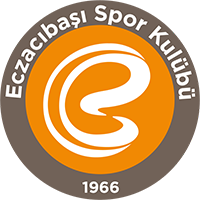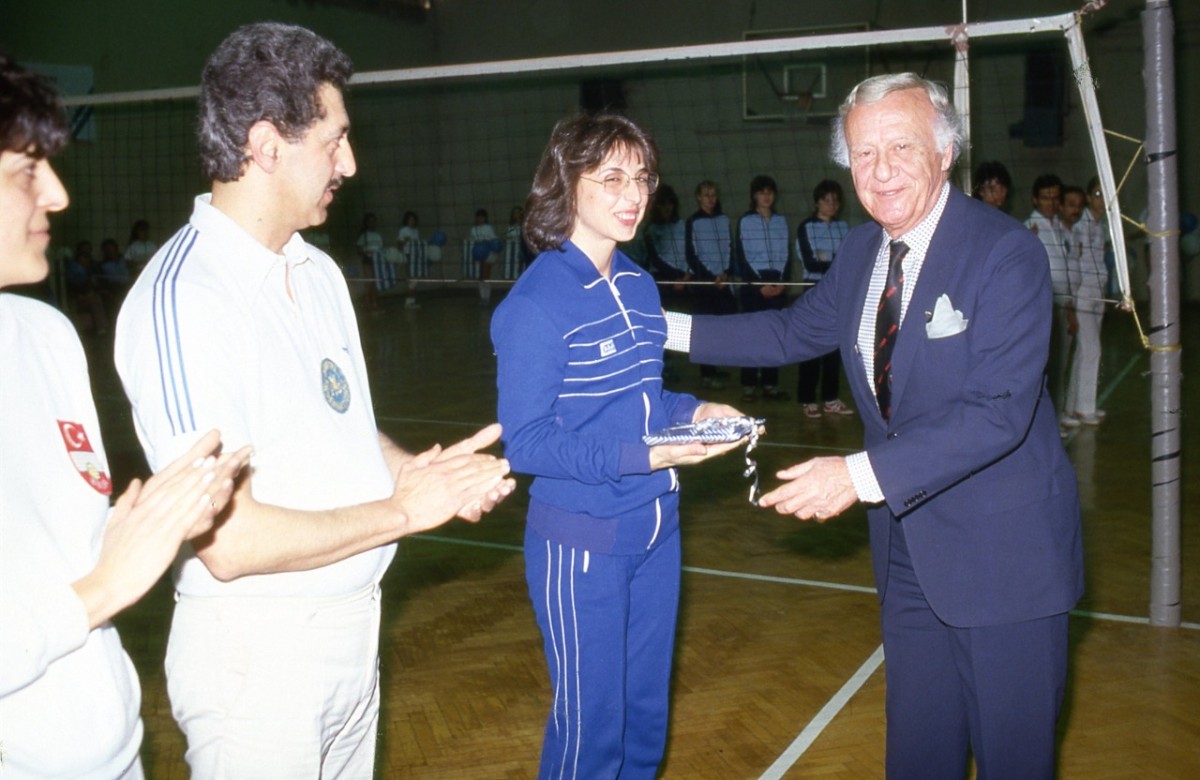

1. How did you meet volleyball?
Back in the days, there were no academies or sports schools that provided volleyball opportunities in clubs. I was playing volleyball with my school friends in the gymnasium of the German High School where I studied and participating in high school matches. My teachers at the German High School supported us in sports, and upper-class students who were interested in volleyball would come and coach us. Our field was quite small. At the time I mentioned, I was 14-15 years old, which can be considered late for today's volleyball. When I turned 17, they wanted to transfer me and a few people to Galatasaray Sports Club. In this way, I started playing volleyball in leagues under a license. It took me until I was 17 to get my first license, because at that time there was no youth team league to start volleyball earlier. There were only amateur branches of major football clubs and neighborhood teams such as Levent, Rasimpaşa, Şehremini and Altınyurt. The gym on the ITU campus, where we played league matches, did not have tribunes or heating. I can say that we didn't even have an audience to motivate us.
2. In the 1970s, you were transferred to Eczacıbaşı Sports Club, which reached a professional management when volleyball was still an amateur branch. How would you describe those years?
At that time, Eczacıbaşı made a great move and stepped into the world of volleyball. The club was founded in 1966 and they started from the bottom and progressed step by step to form their own team. In the 1970s, the women's volleyball team began to gain success. Something had happened that had never happened before. It was the first time that a private organization was investing in sports in Turkey. The club built its hall in Levent for the first time and Turkey's best volleyball coach, Cengiz Göllü was the head of the team. The fact that the club had a hall, that they trained regularly, and that they had a very important head coach like Cengiz Göllü suddenly made a huge difference. We started to play matches as amateurs and lost to Eczacıbaşı. I loved playing volleyball, but the environment I was in was not giving me what I wanted. Quality training, a warm hall, and a safe and pleasant environment where we could study were the most important reasons for my transfer. At that time, Eczacıbaşı started paying us a small salary. The pocket money they gave disciplined us. In this way, it created an important source of motivation for us to come to training regularly, take care of ourselves and focus on volleyball. Since we were all students at that time, we received pocket money from our families. I stopped receiving pocket money from my family. It was one of the important turning points of my life.
I started to become an athlete who could go to matches and travel, be applauded by people, and stand on my own feet. At that time, the teams of the Eastern Bloc countries were very strong. It was not possible for us to be successful in the matches. Since communist countries saw athletes as a propaganda tool, they were training incredibly strong athletes in camps. They were also physically superior to us. Their facility advantages were also greater than ours. At that time, it was a different period for Türkiye because we had trouble getting foreign currency. A normal citizen could not go abroad. We could not carry foreign currency with us when going abroad. The teams in the countries we visited were hosting us. During the camps, our coach Cengiz Göllü would support us both as our manager and coach. In addition to the facilities of the Eastern Bloc countries, there were also magnificent sports facilities in the cities of Western European countries. We felt like heroes when we won the matches we played against the odds at that time. Burhan Felek Sports Hall, where we played our only matches, was built outside the facility in Eczacıbaşı in Turkey.
At that time, families did not want to send their daughters to sports. Playing volleyball was frowned upon. Just playing volleyball in schools would be good for people. Şakir Eczacıbaşı would personally meet with the families so that the tall girls he found through acquaintances in Levent could play volleyball. He would try to persuade his daughters by saying that he would give them a job if they sent them to volleyball. In the early 1980s, as we started to win in Europe, people began to appreciate us. As a result, the perspective in society changed. We started to be seen as girls who did good deeds. As the national matches were broadcast on TRT, the number of girls coming to the gym began to increase.
3. In your book 'Memoirs of a Volleyball Player', you talked about your experiences as an athlete in the years when Eczacıbaşı Sports Hall was first established. Eczacıbaşı will soon launch its new, state-of-the-art, nature-friendly salon in Kartal. What do you think about the contributions of sports and Eczacıbaşı to Turkish sports from past to present?
Eczacıbaşı is an organization that is the pioneer of amateur sports. They have made great contributions to sports these days. At that time, other private organizations that saw Eczacıbaşı started to establish teams based on the model created by Eczacıbaşı. Other organizations were encouraged by this model. Kartal is a region of Istanbul with a large population. I think they will get good results.
4. On the 100th anniversary of Atatürk's birth, you achieved high-level success in Europe and were named Atatürk's daughters. Can you tell us about the tournament, what was the process like?
At that time, communist countries were very dominant. We would draw the first draw in the European Champions League and face rivals such as Austria and Germany. After passing the first two rounds, we would always face an Eastern Bloc country in the third round. It would not be possible to pass that round. In those years, a few countries withdrew from the championship due to political reasons, and the way was opened for us. After we successfully eliminated two or three teams, we had the chance to go to the finals. Going to the finals was very exciting, but we didn't have much hope of winning. We were faced with the Czech Republic, Albania, and Hungary. We were again faced with three communist countries. Hungary and the Czech Republic were physically superior to us. In that tournament, everyone won the matches they played against each other, and if we beat Albania 3-0, we had the chance to come second. We were very excited. Our match was at 09:00 in the morning. We were playing European Champions League matches in a very small hall with a single stand. It was a very distant view from today. The tournament we attended the finals for the first time was in February and the weather was very cold. Cengiz Abi woke us up early in the morning so that we could prepare for the match. At 06:00 on Sunday morning, we went out in the knee-deep snow and walked until it was freezing. That walk brought us to our senses and was good preparation for the match. It was around 08:15 when we went to the field. Albania came to the hall late, thinking that they would beat us. Before they even woke up, we entered the match like firecrackers and won the match 3-0. We sat and waited for the result of the next match. The Czech Republic beat its opponent as we expected, and we became second in Europe for the first time. That second place created a huge stir in the country when we returned to Turkey. Until then, no team sport (in Turkey) had ever finished second in the Champions League. All the newspapers chose us as the “Athletes of the Year”. We have won many awards such as the Presidential Special Award, TRT, Sports Writers Special Award etc.
As a team, we went to Anıtkabir to visit our Atatürk. Kahraman Bakçum, one of the senior journalists of that time, wrote a beautiful column under the name "Atatürk's Daughters". In the article, “Atatürk's greatest ideal is for women to take part in every part of society. Women had not been able to participate in one sport until that day, and now they did. Atatürk would be very happy if he saw it," he said. After that year, appearing on the European stage began to be considered natural.
5. How was both volleyball and school life for you? What advice would you give to young people who want to combine school and sports today?
I suggest they use their time wisely. In our period, too, it was difficult to adjust the time. Now many universities offer scholarships to athletes and are tolerant about attendance. I think athletes can continue volleyball by studying.
6.How is your day going right now? Are you following volleyball today?
I'm not someone who has a habit of being idle. I published a book about my volleyball memories. After that, I wrote another book about the Etiler district, where I lived for 55 years. I like to write about my memories by enriching them with documents and photographs. I like traveling with my friends, reading books, and doing sports. As volleyball has become very successful and popular today, we former volleyball players are also proud, and in a way our popularity continues.
7. How did the success of our National Team, which became the Volleyball Nations League and European Champions in the 100th Anniversary of the Republic, make you feel?
Our National Team has become the most loved and appreciated team with its successes. The girls have become quite popular. They were the element that added the most color to our lives this summer. I was very proud and happy after their success. They called me on television and asked me to give my opinion, and I was glad. As people who have devoted themselves to this business and experienced the most difficult times of this business, we are very happy to see that volleyball has developed and reached successful places. I receive a lot of feedback and congratulations, even from people who have nothing to do with volleyball. Because today's volleyball is so successful, we can still stay in volleyball.
8. Finally, can you tell us about an interesting memory from your managerial career at Eczacıbaşı Sports Club after your athletic career?
Being a manager is very different from being an athlete. I was very lucky back then. I became a manager with a young generation when Naz Akyol was 15 years old. As a club, they wanted us to make a new breakthrough. We became champions three years in a row with a young team and a Brazilian coach (Marco Motta) who can coach this team well and is prone to working with young people. I was able to act as a big sister to them and we were able to step into something new together. First, we transferred Esra Gümüş. The next year, we made her team captain. We made this transfer as the first thing we did, seeing the lack of outside hitters in the club. Esra was also a very determined and hard-working athlete. Together with our libero Gülden, they took the team and turned it around. We worked in very good harmony with the young people, we went to away games and fortunately, we became the Turkish Champion with this young team for 3 years. These were very beautiful and unforgettable days for me. With such a young team, we were able to get many victories against teams that were stronger than us on paper.
